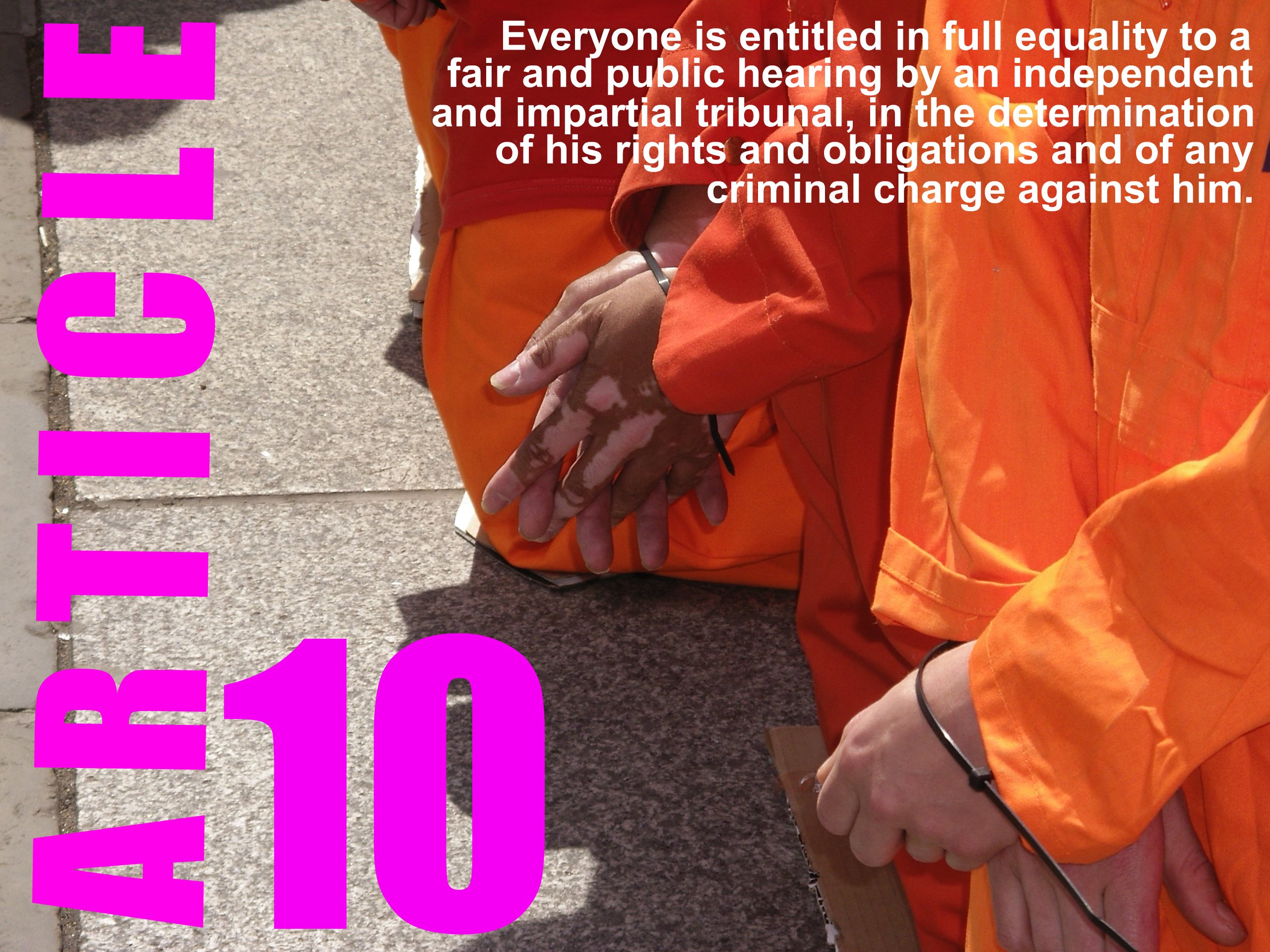
Image courtesy CagePrisoners
John Yoo, author of the Bush Administration’s legal memos authorizing torture, is right about one thing: when it comes to Obama’s counterterrorism policies, “the ironies abound.”
Here is what Berkeley law professor Yoo recently wrote about the presidential “kill lists”:
Candidate Obama campaigned on narrowing presidential wartime power, closing Guantanamo Bay, trying terrorists in civilian courts, ending enhanced interrogation, and moving away from a wartime approach to terrorism toward a criminal-justice approach. Mr. Obama has avoided these vexing detention issues simply by depriving terrorists of all of their rights—by killing them.
So what about “these vexing detention issues”? How is the Obama Administration dealing with Guantanamo years after the President vowed to close the prison? Does his Administration’s detention policy show more signs of transparency and accountability than his secret death sentences being dispensed from the skies?
Regrettably, the answer is no.
A decade after the first of some 800 men were detained indefinitely at Guantanamo without charges or trial, 168 remain.
Of those, 87 were cleared for release by the Guantanamo Task Force appointed by the President in January 2009. And they are going nowhere, thanks to Obama’s moratorium on the release of Yemenis – who constitute 58 of the 87– in the wake of the news that the perpetrator of the Christmas 2009 bomb plot had been trained in Yemen.
The Guantanamo Task Force decided that 46 other men should be held indefinitely without charge or trial. Why? Because we tortured them, and any evidence produced in court would be tainted by torture. Therefore, we condemn them to a lifetime of psychological torture through indefinite detention.
According to the Task Force, 33 of the remaining detainees should be tried, even if they too had been tortured. There was enough additional “untainted” evidence that could be produced in Obama’s revamped military commissions to get the result the government wanted.
Those facing death penalty charges include Khalid Sheikh Mohammed (waterboarded 183 times), the four other alleged 9/11 plotters, and the alleged Cole mastermind Abd al-Rahim al-Nashiri. Held for four years in CIA prisons before being sent to Guantanamo in 2006, al-Nashiri was reportedly waterboarded and interrogated with a revving power drill held to his hooded head.
By the time Khalid Sheikh Mohammed and his co-defendants were arranged at “Camp Justice” on May 5, 2012, it was clear that the Administration was more interested in controlling what information reached the public than in staging a transparent trial.
It issued an order requiring that “any and all statements by the accused are presumptively classified” and ordering anything a detainee had said to a lawyer or in court to be cleared by a censor before it was transmitted to the audience, including journalists and victims’ families watching a closed circuit broadcast in Fort Meade in Maryland. Any claims of being tortured could be nipped in the bud.

Secrecy has remained the watchword in al-Nashiri’s pre-trial hearing, with the government anxious to bar any mention of torture. Andy Worthington describes the jostling between al-Nashiri’s attorney Richard Kammen and the tribunal, as military judge Col James Pohl strove to give the proceedings legitimacy:
When Kammen tried to dismiss Col. Pohl’s defense of the ‘process’ at Guantánamo, by pointing out that the Spanish inquisition and the Soviet show trials were a ‘process’ too, Col. Pohl took exception. ‘Mr. Kammen, this process was set up by the United States Congress and set up by the president of the United States,’ he said.
On July 18, Col. Pohl ordered the proceedings to be held behind closed doors with the defendant excluded because classified CIA evidence was going to be introduced.
The next day, al-Nashiri decided to stop attending the sessions while his attorney called for the trial to be televised to maximize potential for transparency. With a break for Ramadan, Obama’s first military tribunal is scheduled to resume its trail-blazing path to cut rate justice on August 22.
Any lingering assumptions about the Obama Administration’s commitment to accountability and justice for Guantanamo detainees were vanquished in mid July when, in the words of a New York Times editorial, the government adopted “a spiteful new policy at Guantanamo Bay.”
The new rules affected detainees who had used the 2008 Supreme Court decision in Boumediene v. Bush to submit habeas corpus petitions in US federal courts challenging their indefinite detention. If they lost their legal challenges (and the US Court of Appeals for the DC Circuit was bent on making sure many would) then they would no longer be able to meet with a lawyer unless a military commander gave his consent.
Not only was the Administration (in the words of the Times editorial) “imperiously punishing detainees for their temerity in bringing legal challenges to their detention and losing.” The new rules also prevented attorneys from sharing information with other detainee lawyers, and using it in preparing their defense.
These vindictive measures were the last straw for Salon commentator Glenn Greenwald, who on July 23 penned a stinging piece entitled “The Obama GITMO Myth.”
Greenwald maintains that the President was never solidly committed to his campaign promises of closing Guantanamo in order to try detainees in federal courts. Instead, he wanted to preserve indefinite detention – on US soil.
He writes of the Administration’s attempt to transfer Guantanamo detainees to the Thompson federal prison in Illinois:
The plan was classic Obama: a pretty, feel-good, empty symbolic gesture (get rid of the symbolic face of Bush War on Terror excesses) while preserving the core abuses (the powers of indefinite detention), even strengthening and expanding those abuses by bringing them into the U.S.
Thanks to Congress and the President who signed indefinite detention into law as part of the NDAA, the United States may soon become a country that not only kills its citizens without charges or trial, but buries them alive on the say so of the executive branch with no end in sight.
